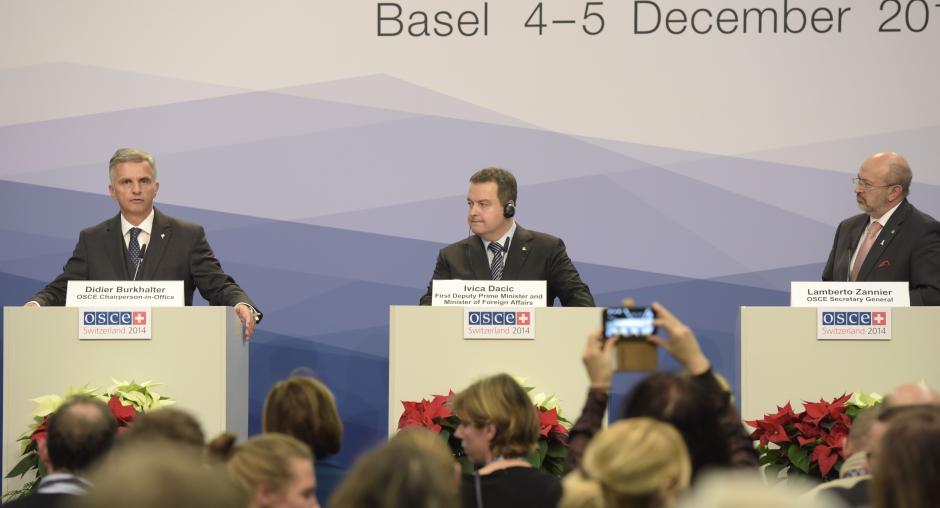OSCE proves its value and ability as a forum for dialogue, says OSCE Chairperson-in-Office Burkhalter as Basel Ministerial Council ends

BASEL, Switzerland, 5 December 2014 – The OSCE proved its value and ability as a forum for dialogue while its key principles were defended, said OSCE Chairperson-in-Office and Swiss Foreign Minister Didier Burkhalter as the 21st Ministerial Council concluded in Basel today. Burkhalter welcomed decisions on Germany and Austria assuming the OSCE Chairmanships respectively in 2016 and 2017, and lauded decisions to further enhance the fight against terrorism and boost States’ preparedness against the threat of natural disasters.
He said the discussions at the Ministerial Council, which drew a record 72 delegations, 1,300 delegates and 53 ministers, were straight-forward and productive.
Despite the backdrop of one of the worst crises in the Euro-Atlantic and Eurasian area since the end of the Cold War, Burkhalter said it was possible to listen to the differences and recognize the commonalities – the prime purpose of both the OSCE and the Ministerial Council, he added.
He said OSCE participating States are united in recognizing that there is no military solution to the crisis in and around Ukraine and ministers pledged their support for a peaceful settlement and OSCE initiatives such as the Trilateral Contact Group talks and the OSCE Special Monitoring Mission to Ukraine.
He praised decisions taken in the politico-military dimension calling on States to prevent terrorists from benefitting directly or indirectly from ransom payments or from political concessions, and to countering the phenomenon of foreign terrorist fighters.
He said that States' commitment and responsibility to peace and stability is growing, saying this was best illustrated by the signing ceremony held during the Ministerial Council as Bosnia and Herzegovina, Croatia, Montenegro and Serbia took ownership of regional arms control, as stipulated in the 1995 Dayton Peace Agreement.
In the economic and environmental sphere, States agreed to work together to mitigate the risk posed by natural disasters, and to tackling corruption by promoting a culture of integrity, transparency and accountability across all sectors of society.
A new decision also calls on political leaders and public figures to speak out strongly and promptly against anti‑Semitic incidents, promoting educational programmes as well effective investigations and prosecutions of those who commit acts of violence motivated by anti‑Semitism.
Two decisions were taken in the area of promoting gender equality, including a call on States to take comprehensive action in combatting violence, particularly domestic violence, against women, and a new addendum to the 2004 OSCE Action Plan for the Promotion of Gender Equality will be crafted next year to bring the document up to date.
Speaking alongside Burkhalter at a media briefing, OSCE Secretary General Lamberto Zannier said: “This year has been one of the most challenging in the entire history of the OSCE. Thanks to the leadership and vision of the Swiss Chairmanship we have managed to overcome many divisions seen over the course of the year and at the Ministerial Council, sowing the seeds for a great number of positive initiatives which will bear fruit in the years to come. I look forward to continuing our work with the incoming Serbian Chairmanship next year, and the future OSCE Chairmanships of Germany and Austria.”
